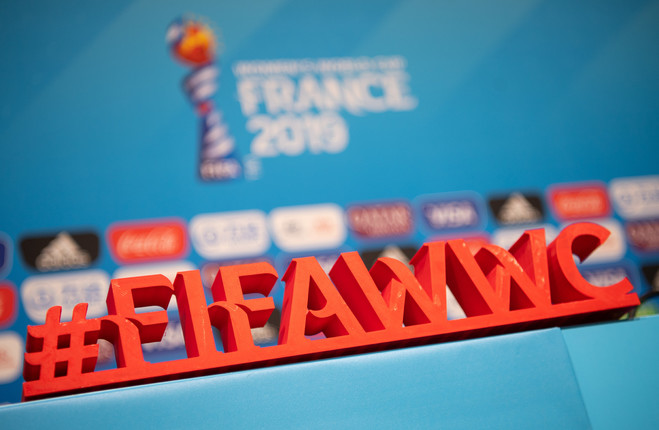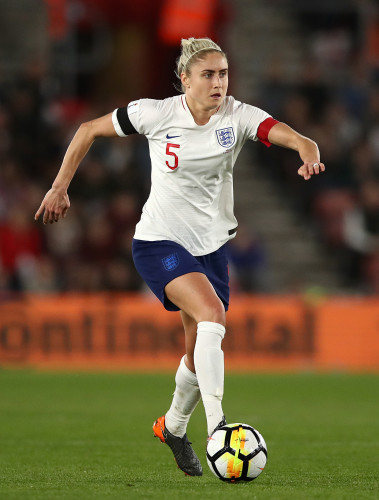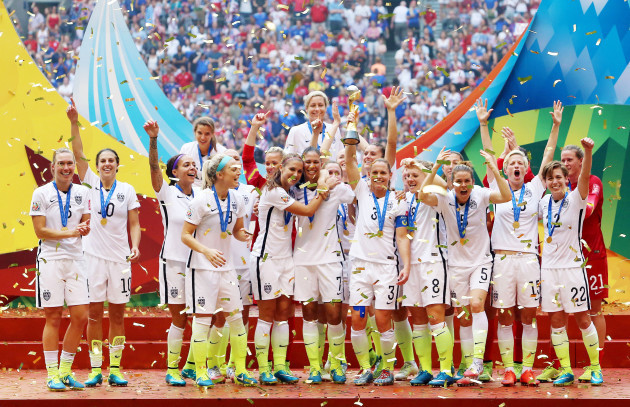FOUR YEARS AGO, I was in Canada covering the Women’s World Cup. I was back in my Ottawa base, having watched the United States book their place in the final the night before at the Olympic Stadium in Montreal. It had been a gripping, exhaustive battle against Germany and a privilege to witness and write about.
I tuned into TV coverage of the other semi-final: England versus Japan. It had been a remarkable tournament for Mark Sampson’s side. They’d shown plenty of resilience in overcoming an opening day loss to France and managing to still get out of their group. But it was in the knockout stages where they really blossomed. There was a statement-wielding and unexpected victory over Ada Hegerberg’s Norway in the round of 16, a win best remembered for Lucy Bronze’s terrific winner. In Vancouver, in front of 55,000 partisan spectators, they eliminated the host nation. Their story had genuinely captivated a country.
Captain of the side was Steph Houghton, a powerful, commanding unit and a real warrior. A born leader, she stepped up and scored a crucial equaliser against the Norwegians, soaring between two red shirts to plant a superb header back across goal to the far corner.
Yet, her first touch against the Japanese was accompanied by some unforgettably cringeworthy commentary.
The voice told a worldwide audience in the tens of millions that Houghton was obsessed with David Beckham and, when she met him in person, phoned her mother immediately afterwards to tell her how perfect he was.
It was the male gaze on full display.
An anecdote so irrelevant to the moment but rendered as high priority by the man with the microphone. It was demeaning and derogatory but the damage was really done by the flippancy with which the story was delivered. The wider ignorance was damning. There was a clear message: the cuteness and fluffiness of the yarn seemed a perfect fit for a women’s tournament.
Of course, it wasn’t an isolated incident. Men generally not knowing how to report or analyse women’s sport is hardly a recent phenomenon. But four years ago, some of the preview material for the World Cup was extraordinary. There was an infamous CNN piece about Alex Morgan, the most high-profile US player and a decorated athlete, that described her as ‘football’s answer to Ursula Andress’. The opening gambit – remember, in a feature article on an iconic sportsperson, went as follows:
“She looks every inch a Bond girl, reclining in the Caribbean shallows, the breakwater washing over her bronzed body as she runs her fingers through her long, lustrous tawny locks”.
Yes, the writer – surprisingly a guy – went into some forensic detail about Morgan’s photoshoot for the Sports Illustrated swimsuit edition.
Thankfully, this Women’s World Cup has avoided such cliched nonsense. That’s largely owing to various commitments made in recent years to properly invest in the coverage of women’s sport and also the largely unforgiving social media space. Back in 2015, there was some wiggle room. Now, such poor editorial decisions are immediately lambasted. There is influence there. And for women’s sport generally, that has been a seismic shift.
Still, wider issues remain. One of the biggest subplots you’ll hear a lot about in the next few weeks is equality and how teams like the United States and Norway are immersed in battles with their respective federations to get a fair deal.
But as much as the teams are under-valued and under-appreciated, the tournament itself is greatly discriminated against by the organisers. It’s worth reminding ourselves that the final of this year’s Women’s World Cup takes place on 7 July. Incredibly, the finals of both the Gold Cup and the Copa America will be played on the same day. Even more incredibly, Victor Montagliani, the president of CONCACAF, the organisation behind the Gold Cup, simply shrugged his shoulders when pressed on the subject.
“It was simply an error,” he told SI’s Grant Wahl.
There was no intent and can see why some fans were disappointed. But by the time the error was brought up, it was difficult – for many, many reasons – to even move one day. But we tried. It’s not like we didn’t look into it.”
What a suitably defensive response. ‘It’s not like we didn’t look into it’. ‘We tried’. ‘There was no intent’.
It was a massive mistake and needed rectifying immediately. But, like so much, the main objective was to just move on as quickly as possible and hope concerned parties would forget. Unfortunately for Fifa, there was another fiasco when it was revealed a sizeable portion of people who bought a bundle of Women’s World Cup tickets – many of whom were intent on bringing their children to games – discovered the seats weren’t together. Only when a social media backlash ensued and the story went viral did Fifa make a statement and outlined how they were trying to find a solution.
This World Cup will be the biggest in history. There has never been such a level of interest and genuine passion for women’s football and the progress made in the last two years – the domestic leagues, the attendances, the media coverage, the various broadcast agreements – means there is plenty to look forward to.
But it also represents a platform where important issues should not be ignored. For a long time, the tournament was seen as the ‘women’s moment’, effectively one giant PR campaign that came along every four years. A sort of Corporate Social Responsibility strategy for Fifa. Millions cheered the players on, cameras followed them for a couple of weeks, there was a less-than-subtle message of, ‘Aren’t they great, the women?’ and then everything went dark.
This is a different era now. It remains a wearying and relentless battle to be heard but women are getting there. Athletes, given their profile, have been at the forefront of a genuinely revolutionary movement. The Women’s World Cup is a captivating and special thing. But, like every major event, there’s a wider context to it. Over the next few weeks, let’s remember that.
The42 is on Instagram! Tap the button below on your phone to follow us!




